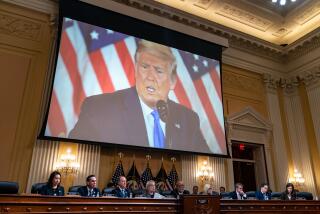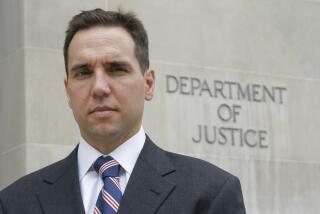No Off Switch
- Share via
There is only one switch on the machinery that Washington has set in motion to sort out the bizarre White House escapades in Iran and Nicaragua. It can be turned on, but it cannot be turned off until the investigation has run its intricate and fractious course.
Optimists say that it may take 12 weeks for the truth to emerge. Pessimists talk of nine months or more. In neither event can the White House shape policies that are crucial to the nation’s security and well-being without a major staff shake-up, starting at the top.
It will take time for select committees in the House and Senate and an independent counsel to staff up and set their agendas. That will not lift the siege around the White House, but, coupled with the holiday season, it may provide a period of relative quiet.
President Reagan should take advantage of the time to thank Donald T. Regan for his service as chief of staff and speed him on his way. What the President needs now is a right-hand man who understands that progress in Washington is best made by negotiating with Congress, not barking at it. That will apply equally to the urgent policy matters and the investigation of actions that started with White House-approved arms sales to Iran, moved to skimming profits from the sales to finance Nicaraguan rebels, the contras , and now spills over into official involvement in covert support for the contras, the financing of campaigns against anti-contra Congress members and whatever may turn up next.
Reagan needs someone who will not feel compelled to go on the defensive every time someone utters the word scandal . And he needs someone whom he can trust and who will not have to waste time learning the ropes. Only one man in the Administration fits that job description: James A. Baker III, former White House chief of staff who became Treasury secretary after the President’s landslide reelection in 1984. And the President should call him back at once.
Policy issues continue to pile up, from changes in federal health-care programs to problems at the Hanford Nuclear Reservation, which produces weapons-grade plutonium for America’s nuclear arsenal. But three issues stand out--foreign trade, the staggering national debt and arms control. Any one of them would be a handful for a White House staff operating at peak efficiency. Any of the three would overwhelm a staff as distracted as that now serving the President.
Frank C. Carlucci III, who is already cleaning house at the National Security Council where he will take charge early next year, may be able to unravel efforts to achieve reductions in Soviet and American nuclear weapons and ground forces that have been snarled since Reykjavik. That alone will be a massive task, and still leaves trade and budgets to cope with.
As Treasury secretary, Baker has been living with the issues of trade and the federal budget deficit for months, and, again, would not have to spend time mastering the details.
The White House probably will ask Congress to spend slightly more than $1 trillion in fiscal 1988--tens of billions of dollars more than the federal government will collect in revenue. If the economy stumbles in 1987, what now looks to be a $158-billion budget deficit would grow, and the national debt, already more than $2 trillion, would grow along with it.
Getting the federal budget under control will take the best efforts of both Congress and the White House--and a virtually inexhaustible supply of cool. A balance between cuts in social programs and cuts in defense spending that both could tolerate, if not enjoy, has been achieved recently only after angry outbursts of blame--even with Republicans in control of the Senate. With Democrats now dominating both houses of Congress, outbursts are out.
This week’s report of another new record-high deficit in America’s trade with the rest of the world emphasizes the importance of still another issue on which the White House is out of step with Congress. Democrats, ignoring every lesson of economic history, will return to Washington in January clamoring for protection of American industries and jobs with artificial barriers to trade that will not solve America’s problem and that could touch off a world recession. Congress must be persuaded otherwise.
This is not a workload that can be handled by a White House spooked by scandal, nor is it one that can be swept aside. The investigative machinery is moving, however slowly, and cannot be stopped. The White House, like all Americans, must wait it out. Like all Americans, it cannot drop everything to watch the machinery. The President must repair his ranks at once.
More to Read
Sign up for Essential California
The most important California stories and recommendations in your inbox every morning.
You may occasionally receive promotional content from the Los Angeles Times.













